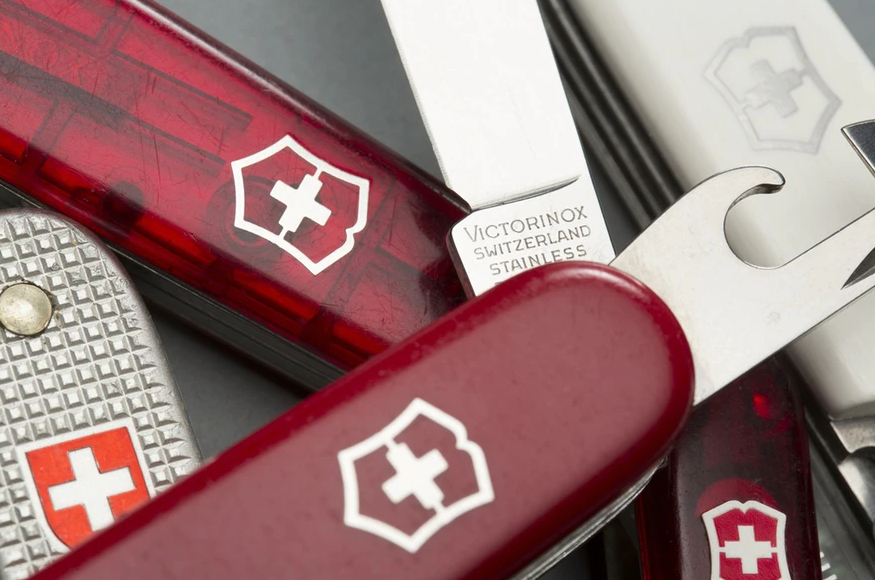Leading Swiss brands have withdrawn from Russia because of the war in Ukraine. However, research by a Swiss newspaper shows that while a company can leave a country, its products often remain on shelves.
“It’s a mass exodus. Since Russia invaded Ukraine in February, thousands of foreign companies have left the country. Some with grand gestures, others quietly,” the NZZ am Sonntag wrote in an in-depth article.
Victorinox, for example, maker of the iconic Swiss Army Knife, publicly announced shortly after the outbreak of war that it would no longer supply products to Russia. But since the knives are very popular in Russia, it’s unsurprising that dealers continue to sell them through unofficial channels on the so-called grey market.
Victorinox says its former distributors still have stocks and use them to supply dealers. “We’re monitoring this since it violates our trademark regulations,” the company said, adding that it’s a difficult and a long-term process.
But by no means all Swiss companies and brands have withdrawn from Russia. The most prominent – and also the most criticised – of those who have stayed behind is Nestlé. After the outbreak of war, the food multinational said only essential products would be sold to Russia. However, it soon turned out that Nestlé was merely not selling premium brands such as San Pellegrino sparkling water. Well-known products such as KitKat or Nesquik continued to be available on Russian shelves.
After forceful accusations, including from Ukrainian President Volodymyr Zelensky, that Nestlé was helping to finance a war regime, the company restricted its product range further. Now only baby food and medical products are to be sold to Russia. Nestlé claims it will no longer promote its products in Russia and that it has stopped all local investments.
Nestlé’s American competitor Mondelez has taken a similar position. Its portfolio includes Toblerone, perhaps the best-known Swiss brand in the world. Toblerone is still available for purchase in Russia.
The pharmaceutical industry also continues to export to Russia, but without the accompanying controversy. “Medicines are for people, not for regimes,” Novartis Switzerland CEO Matthias Leuenberger said recently.
Grey markets
Overall, the Swiss economy exported goods worth just under CHF2.2 billion ($2.2 billion) to Russia between January and September, despite sanctions. That is similar to the amount exported in 2021 in the same period. Exports of medicines in particular have increased.
The watch industry, which has experience in the fight against counterfeiting and the grey market, has developed methods against unofficial distribution channels.
“We regularly make test purchases worldwide to check the origin of the product by means of serial numbers or special markings,” writes Swatch. If a dealer is found to be involved in grey market activities, cooperation is terminated, it says.
Swiss computer accessories manufacturer Logitech also writes: “We have a global process to identify grey market activities.” However, it adds that this will be more difficult in Russia now that they are ending their business activities there.
Logitech, known for its computer mice, has not supplied Russia since March. Nevertheless, its products are still available there. Logitech explains this by saying that there are still residual products in the country.
‘Beyond our control’
That is quite possible. But the fact is that most companies simply do not know whether their products enter Russia via the grey market.
For example, Swiss chocolate company Lindt & Sprüngli opened its first Russian shop in 2016 and has been expanding steadily ever since. Last year Lindt grew by 18% in Russia, the most popular product being the Lindor ball. Now Lindt has exited the market, but Lindor balls, as well as other Lindt products, can still be bought in Russian supermarkets.
In response to an enquiry by the NZZ am Sonntag, Lindt said: “The whereabouts of goods that we sell to retailers are beyond our control when they are handed over.” It added that it was no longer within the company’s sphere of influence if a retailer decides to resell goods across borders.
Saying goodbye is sometimes harder than you think, the paper concluded.
Full story here Are you the author? Previous post See more for Next postTags: Featured,Latest news,newsletter

























